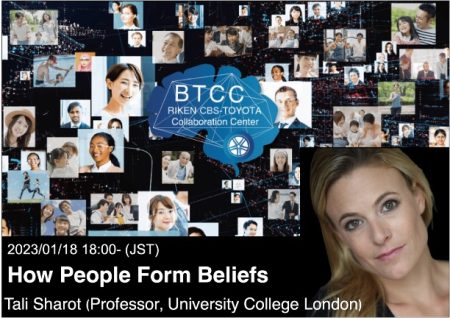- Home >
- 1/18にTali Sharot氏が特別講演「信念の形成過程(How People form beliefs)」を行いました。
News
1/18にTali Sharot氏が特別講演「信念の形成過程(How People form beliefs)」を行いました。
2023.04.27

How People Form Beliefs
In this talk I will present our recent behavioural and neuroscience research on how the brain motivates itself to form particular beliefs and why it does so. I will propose that the utility of a belief is derived from the potential outcomes associated with holding it. Outcomes can be internal (e.g., positive/negative feelings) or external (e.g., material gain/loss), and only some are dependent on belief accuracy. We show that belief change occurs when the potential outcomes of holding it alters, for example when moving from a safe environment to a threatening environment. Our findings yield predictions about how belief formation alters as a function of mental health. We test these predictions using a linguistic analysis of participants’ web searches ‘in the wild’ to quantify the affective properties of information they consume and relate those to reported psychiatric symptoms. Finally, I will present a study in which we used our framework to alter the incentive structure of social media platforms to reduce the spread of misinformation and improve belief accuracy.
信念の形成過程
この講演では、私たちが最近行った行動科学と神経科学の研究を通して、脳がどのようにして特定の信念を形成するために自らを動機づけ、そしてそれがなぜそうするのかを説明します。信念の効用関数は、その信念を持つことに関連する潜在的な結果から導かれると提案します。結果は内的(例:ポジティブ/ネガティブな感情)または外的(例:物質的な利益/損失)であり、その中の一部だけが信念の正確さに依存しています。安全な環境から脅威的な環境に移動するときなど、信念を持つことの潜在的な結果が変化すると、信念の変化が起こります。私たちの研究結果は、精神的健康の機能として信念形成がどのように変化するかに関する予測も導き出します。実際の状況で参加者のウェブ検索の言語分析を行い、彼らが摂取する情報の感情的特性を定量化し、それを報告された精神症状と関連付けることで、これらの予測を検証します。最後に、私たちの枠組みを使用して、誤情報の拡散を減らし信念の正確さを向上させるためにソーシャルメディアプラットフォームのインセンティブ構造を変更した研究を紹介します。
